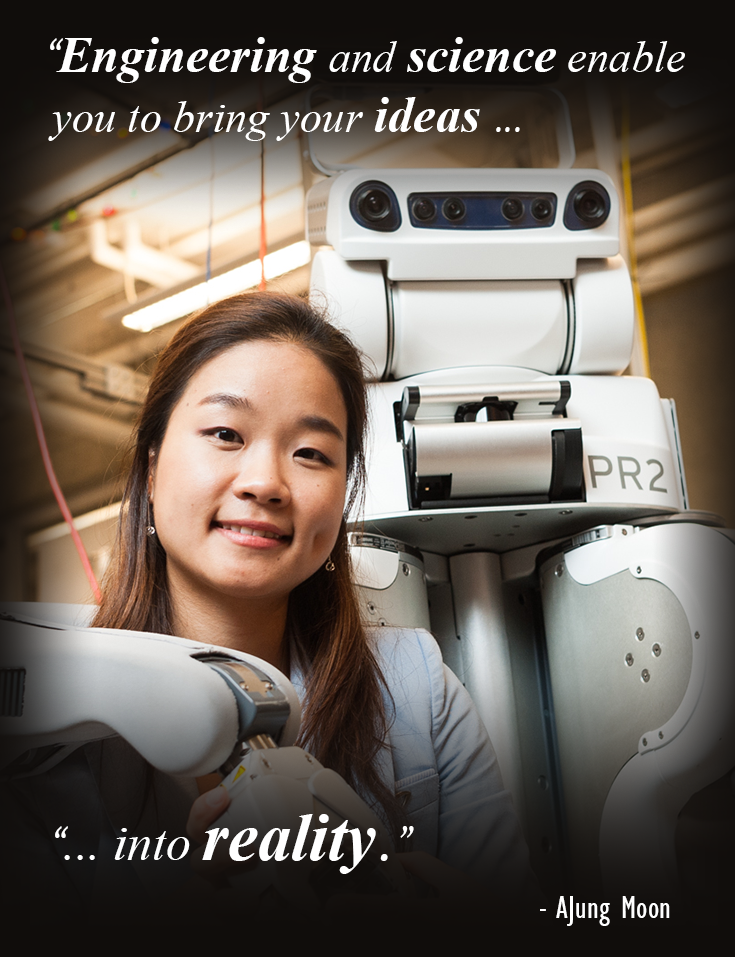Robotics PhD Student
Where are you from and where do you work now?
“I was born and raised in Korea, and spent most of my high school and university life in different parts of Ontario, Canada. Now I am a PhD student working at the CARIS lab, University of British Columbia, Vancouver. I design robots to be more expressive and communicative to people while studying ethical, legal, and societal issues of robotics.”
Why did you choose to work in this field?
“When I was little and people asked me what I wanted to be when I grow up, I would say president of Korea (don’t we all want to be president of something at one point?), philosopher, writer, news anchor and later, programmer and philanthropist like Bill Gates.
Roboticist wasn’t something on my radar until I started studying Mechatronics Engineering at the University of Waterloo – I considered Mechatronics to be programming with extra jazz. While working as a first year Mechatronics engineering co-op student at General Electric, I met a senior mentor who inspired me to think about ethical and societal aspects of robotics, a field very close to mechatronics. Ever since then, I’ve been passionate about the field of robotics, both in terms of discussing its ethical, legal, and societal issues (a field called roboethics), and in designing technologies that make robots more communicative when they interact with people (a field called human-robot interaction).
It turns out that robotics is such an interdisciplinary field of study that my work today involves elements of the many things I wanted to do when I was younger: a bit of philosophy, psychology, lots of writing, presenting, and programming with the goal of making the world a better place.”
What is your favourite thing about your job?
“Being a researcher is like being an entrepreneur of knowledge: it comes with a sense of freedom and need for creativity, leadership, and intellectual sexiness you need to be your own boss. As a researcher in robotics, my job is to think about cool robotics projects that I feel is important and interesting, invest my time into the project, and to discover and share new knowledge that will ultimately make a difference in my field. Most importantly, I get to work with experts in the field who are self-motivated and passionate about similar discoveries. Given the freedom to explore and flexibility to work on many interesting projects, my favourite thing about my job is that it’s really hard not to brag about it.”
What are some of the challenges in your job?
“The biggest challenge in my job is managing my time. I always tend to have so many things I want to do, deadlines I want to meet, that it’s hard to schedule them all in my calendar while making room for some quality me-time.”
What do you like to do in your spare time?
“I happen to have a very long list of hobbies. If I’m not blogging (www.RoboethicsDB.com), microblogging (@Roboethics), or recording podcasts (www.RobotsPodcast.com) about robotics, you’ll find me crocheting amigurumis, watering my tomato plants, making bowls and mugs at a pottery studio, or doing at-home workouts.”
Is there anything you wish someone had told you when you were in high school?
“I wish someone had told me that if the set of things that you’re interested in don’t really go together, or feel weird together, then that means you’ve found your opportunity to learn to integrate different things and exercise the inner innovator in you. When I decided to pursue a minor in Philosophy while studying Mechatronics Engineering, a lot of people thought I was lost, or having an identity crisis. Some people even advised me that I should focus more on one thing, and others explicitly told me “You can’t do that”. The two fields didn’t go hand-in-hand to the majority of people back then, but I went and did it anyway. Now, my interdisciplinary background makes perfect sense in studying roboethics and human-robot interaction today. As one wise roboticist told me, if you can define your work into just one field or category that exists today, you’re not innovative enough.”
In a nutshell, why are engineering and science AWESOME?
“Engineering and science can help you bring your ideas into reality. Regardless of whether you want to work on a cool art project (e.g., a chair that assembles and disassembles itself, or limps across the floor), become a manager in a large company, or be the next big thing, training in engineering and science will give you both technical and non-technical tools you need to make it happen.”
Tell us a joke.
“What is a robot’s favourite type of music?
Heavy metal.”



